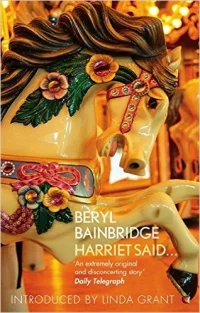
Bainbridge’s first novel written (it wasn’t her first published -it came out in 1972) is apparently loosely inspired by the Parker-Hulme murder case in New Zealand (which you may know from Heavenly Creatures, the Peter Jackson film) however the stories are only similar in so far as they both focus on young girls who intentionally set out to cause harm to an adult; in Harriet Said, though, the goal is not murder, but just really hardcore bullying and stalking. It’s weird and upsetting and sometimes violent.
The story captures really compellingly what it means to be a young teen – the awkwardness, the longing to be significant, the naive sense of control, the sense of utter invincibility paradoxically laced with desperation and insecurity. The unnamed narrator and her best friend Harriet, both thirteen, spend one summer trying to ‘humble’ Mr Biggs, a local middle-aged man whom they call ‘The Tsar’: it’s unclear exactly why, or even what their specific aims are, but the implication is the girls are driven by a bizarre desire for various forms of power – sexual, psychological, geographical. They stalk and bully the Tsar by following him into the woods, along the beach, to his house – but he welcomes this, even though it distresses him, and in fact organises clandestine meetings with them and at one point invites them to his house while his wife is away and basically allows one of his friends to hook up with Harriet (he also tries to sexually assault the narrator in his lounge room – which she kind of welcomes, but is also horrified by). It makes for a really unsettling dynamic where you’re not quite sure what anyone really wants – but what they do want is clearly not quite right.
Importantly, even though the narrator welcomes the Tsar’s sexual advances (she believes she is in love with him) the text in no way endorses the Tsar’s behaviour or posits the narrator’s desire as somehow making it ‘okay’. She is always repulsed by the Tsar even though she longs for him, and indeed, it’s clear that he is taking advantage of and actually grooming her.
I enjoyed reading this a lot. Bainbridge does such an excellent job of dramatising the crazy ways that desire works, and how people often don’t even understand what they want. All the characters are manipulative, but as a reader you never really know to what extent the characters understand their own powers of manipulation, or how conscious they are of the ethics of their decisions, or who has the power in any given scenario. The writing style itself seems to obscure or confuse everyone’s motivations, because the narrator herself at thirteen years old is so unable to clearly perceive others’ thoughts herself. At the same time she and Harriet are incredibly clever and so while they get some things right, they completely fail to gauge the severity of many situations even as they attempt to create that very sense of severity.
My one qualm is that sometimes the writing style was far too formal for such a young narrator. Even though the girls consciously try to be clever and grown-up in their language, sometime it just didn’t ring true. Otherwise this was a great, upsetting and weird story that I totally recommend.
**This is a review of an ARC of the new kindle edition of Harriet Said.